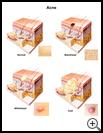
Acne: Brief Version
________________________________________________________________________
KEY POINTS
- Acne is a skin problem that happens when the skin pores get clogged with dead skin cells, dirt, and oil.
- You may receive treatment with soaps, creams, gels, or oral medicines.
- Women taking a medicine called isotretinoin must be careful. Isotretinoin can hurt the baby if you take it while you are pregnant or even if you take it a month or two before getting pregnant.
________________________________________________________________________
What is acne?
Acne is a skin problem. It happens when the skin pores get clogged with dead skin cells, dirt, and oil.
What is the cause?
Hormone changes are one of the main causes of acne. Hormones cause the oil glands to make more oil. You are also more likely to have acne if:
- It runs in your family
- You use greasy or oily products on your skin
- You rub or put pressure on your skin, for example by using a cell phone a lot, or wearing a helmet
- Stress does not cause acne, but can make it worse. For some people, certain foods may make acne worse.
What are the symptoms?
You may have:
- Blackheads (plugged oil glands with black tips)
- Whiteheads (pimples)
- Red bumps called cysts that may hurt or be filled with pus
How is it treated?
Your healthcare provider may give you:
- Soaps to clean your face gently
- Gel to dry up the acne
- Lotion or gel with an antibiotic in it to put on your skin in the places where you get acne
- Skin creams such as Retin-A to prevent pimples
- Antibiotic pills
If you are a woman, your provider may prescribe birth control pills, which can help you have less acne.
Your provider may inject large cysts with medicine. This will help keep you from getting scars.
For very bad cases, your provider may give you a medicine called isotretinoin. Women must be careful when taking this medicine. It can hurt the baby if you take it while you are pregnant or even if you take it a month or 2 before getting pregnant.
How can I take care of myself?
Follow your healthcare provider's advice. It's also a good idea to:
- Wash your face gently 1 to 2 times a day with a mild soap. Clean your hands and use your fingers to wash your face rather than a washcloth. Wash your face as soon as you can after you exercise.
- Change the washcloth that you use on your body every day. Germs can grow on damp cloth and can be spread to your face.
- Don’t squeeze, pick, scratch, or rub your pimples. You may spread infection and get scars.
- Shampoo your hair at least twice a week. Keep your hair away from your face during the day and at night while you sleep.
- Try not to work in hot kitchens where greasy foods are cooked.
- Keep all appointments for provider visits. Keep a record of the medicines you have tried. Write down if they have worked. Let your provider know if your medicine isn't working.

